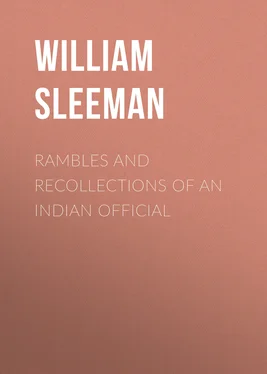William Sleeman - Rambles and Recollections of an Indian Official
Здесь есть возможность читать онлайн «William Sleeman - Rambles and Recollections of an Indian Official» — ознакомительный отрывок электронной книги совершенно бесплатно, а после прочтения отрывка купить полную версию. В некоторых случаях можно слушать аудио, скачать через торрент в формате fb2 и присутствует краткое содержание. Жанр: Путешествия и география, История, foreign_edu, foreign_antique, foreign_prose, на английском языке. Описание произведения, (предисловие) а так же отзывы посетителей доступны на портале библиотеки ЛибКат.
- Название:Rambles and Recollections of an Indian Official
- Автор:
- Жанр:
- Год:неизвестен
- ISBN:нет данных
- Рейтинг книги:4 / 5. Голосов: 1
-
Избранное:Добавить в избранное
- Отзывы:
-
Ваша оценка:
- 80
- 1
- 2
- 3
- 4
- 5
Rambles and Recollections of an Indian Official: краткое содержание, описание и аннотация
Предлагаем к чтению аннотацию, описание, краткое содержание или предисловие (зависит от того, что написал сам автор книги «Rambles and Recollections of an Indian Official»). Если вы не нашли необходимую информацию о книге — напишите в комментариях, мы постараемся отыскать её.
Rambles and Recollections of an Indian Official — читать онлайн ознакомительный отрывок
Ниже представлен текст книги, разбитый по страницам. Система сохранения места последней прочитанной страницы, позволяет с удобством читать онлайн бесплатно книгу «Rambles and Recollections of an Indian Official», без необходимости каждый раз заново искать на чём Вы остановились. Поставьте закладку, и сможете в любой момент перейти на страницу, на которой закончили чтение.
Интервал:
Закладка:
'This of course arises', I observed, 'from the industry of his priests, who are now spread all over the country; and you know that there is hardly a village or hamlet in which there are not some of them to be found subsisting upon the fears of the people.'
'I have no doubt', replied he, 'that the cures which the people attribute to the spirit of Hardaul Lāla often arise merely from the firmness of their faith ( itikād ) in the efficacy of their offerings; and that any other ceremonies, that should give to their minds the same assurance of recovery, would be of great advantage in cases of epidemic diseases. I remember a singular instance of this,' said he. 'When Jeswant Rāo Holkar was flying before Lord Lake to the banks of the Hyphasis, 324a poor trooper of one of his lordship's irregular corps, when he tied the grain-bag to his horse's mouth, said 'Take this in the name of Jeswant Rāo Holkar, for to him you and I owe all that we have.' The poor man had been suffering from an attack of ague and fever; but from that moment he felt himself relieved, and the fever never returned. At that time this fever prevailed more generally among the people of Hindustan than any I have ever known, though I am now an old man. The speech of the trooper and the supposed result soon spread; and others tried the experiment with similar success, and it acted everywhere like a charm. I had the fever myself, and, though by no means a superstitious man, and certainly no lover of Jeswant Rāo Holkar, I tried the experiment, and the fever left me from that day. From that time, till the epidemic disappeared, no man, from the Nerbudda to the Indus, fed his horse without invoking the spirit of Jeswant Rāo, though the chief was then alive and well. Some one had said he found great relief from plunging into the stream during the paroxysms of the fever; others followed the example, and some remained for half an hour at a time, and the sufferers generally found relief. The streams and tanks throughout the districts between the Ganges and Jumna became crowded, till the propitiatory offering to the spirit of the living Jeswant Rāo Holkar were [sic] found equally good, and far less troublesome to those who had horses that must have got their grain, whether in Holkar's name or not.'
There is no doubt that the great mass of those who had nothing but their horses and their good blades to depend upon for their subsistence did most fervently pray throughout India for the safety of this Marāthā chief, when he fled before Lord Lake's army; for they considered that, with his fall, the Company's dominion would become everywhere securely established, and that good soldiers would be at a discount. ' Company kē amal men kuchh rozgār nahin hai ,'—'There is no employment in the Company's dominion,' is a common maxim, not only among the men of the sword and the spear, but among those merchants who lived by supporting native civil and military establishments with the luxuries and elegancies which, under the new order of things, they have no longer the means to enjoy.
The noisy pūjā (worship), about which our conversation began, took place at Sāgar in April, 1832, while I was at that station. More than four-fifths of the people of the city and cantonments had been affected by a violent influenza, which commenced with a distressing cough, was followed by fever, and, in some cases, terminated in death. I had an application from the old Queen Dowager of Sāgar, who received a pension of ten thousand pounds a year from the British Government, 325and resided in the city, to allow of a noisy religious procession to implore deliverance from this great calamity. Men, women, and children in this procession were to do their utmost to add to the noise by 'raising their voices in psalmody ', beating upon their brass pots and pans with all their might, and discharging fire-arms where they could get them; and before the noisy crowd was to be driven a buffalo, which had been purchased by a general subscription, in order that every family might participate in the merit. They were to follow it out for eight miles, where it was to be turned loose for any man who would take it. If the animal returned, the disease, it was said, must return with it, and the ceremony be performed over again. I was requested to intimate the circumstance to the officer commanding the troops in cantonments, in order that the hideous noise they intended to make might not excite any alarm, and bring down upon them the visit of the soldiery. It was, however, subsequently determined that the animal should be a goat, and he was driven before the crowd accordingly. I have on several occasions been requested to allow of such noisy pūjās in cases of epidemics; and the confidence they feel in their efficiency has, no doubt, a good effect.
While in civil charge of the district of Narsinghpur, in the valley of the Nerbudda, in April 1823, the cholera morbus raged in almost every house of Narsinghpur and Kandelī, situated near each other, 326and one of them close to my dwelling-house and court. The European physicians lost all confidence in their prescriptions, and the people declared that the hand of God was upon them, and by appeasing Him could they alone hope to be saved. 327A religious procession was determined upon; but the population of both towns was divided upon the point whether a silent or a noisy one would be most acceptable to God. Hundreds were dying around me when I was applied to to settle this knotty point between the parties. I found that both in point of numbers and respectability the majority was in favour of the silent procession, and I recommended that this should be adopted. The procession took place about nine the same night, with all due ceremony; but the advocates for noise would none of them assist in it. Strange as it may appear, the disease abated from that moment; and the great majority of the population of both towns believed that their prayers had been heard; and I went to bed with a mind somewhat relieved by the hope that this feeling of confidence might be useful. About one o'clock I was awoke from a sound sleep by the most hideous noise that I had ever heard; and, not at that moment recollecting the proposal for the noisy procession, ran out of my house, in expectation of seeing both towns in flames. I found that the advocates for noise, resolving to have their procession, had assembled together about midnight; and, apprehensive that they might be borne down by the advocates for silence and my police establishment, had determined to make the most of their time, and put in requisition all the pots, pans, shells, trumpets, pistols, and muskets that they could muster. All opened at once about one o'clock; and, had there been any virtue in discord, the cholera must soon have deserted the place, for such another hideous compound of noises I never heard. The disease, which seemed to have subsided with the silent procession before I went to bed, now returned with double violence, as I was assured by numbers who flocked to my house in terror; and the whole population became exasperated with the leaders of the noisy faction, who had, they believed, been the means of bringing back among them all the horrors of this dreadful scourge.
I asked the Hindoo Sadar Amīn, or head native judicial officer at Sāgar, a very profound Sanskrit scholar, what he thought of the efficacy of these processions in checking epidemic diseases. He said that 'there could be nothing more clear than the total inefficiency of medicine in such cases; and, when medicine failed, a man's only resource was in prayers; that the diseases of mankind were to be classed under three general heads: first, those suffered for sins committed in some former births; second, those suffered for sins committed in the present birth; third, those merely accidental. Now,' said the old gentleman, 'it must be clear to every unprejudiced mind that the third only can be cured or checked by the physician.' Epidemics, he thought, must all be classed under the second head, and as inflicted by the Deity for some very general sin; consequently, to be removed only by prayers; and, whether silent or noisy, was, he thought, matter of little importance, provided they were offered in the same spirit. I believe that, among the great mass of the people of India, three-fourths of the diseases of individuals are attributed to evil spirits and evil eyes; and for every physician among them there are certainly ten exorcisers . The faith in them is very great and very general; and, as the gift is supposed to be supernatural, it is commonly exercised without fee or reward. The gifted person subsists upon some other employment, and exorcises gratis.
Читать дальшеИнтервал:
Закладка:
Похожие книги на «Rambles and Recollections of an Indian Official»
Представляем Вашему вниманию похожие книги на «Rambles and Recollections of an Indian Official» списком для выбора. Мы отобрали схожую по названию и смыслу литературу в надежде предоставить читателям больше вариантов отыскать новые, интересные, ещё непрочитанные произведения.
Обсуждение, отзывы о книге «Rambles and Recollections of an Indian Official» и просто собственные мнения читателей. Оставьте ваши комментарии, напишите, что Вы думаете о произведении, его смысле или главных героях. Укажите что конкретно понравилось, а что нет, и почему Вы так считаете.












